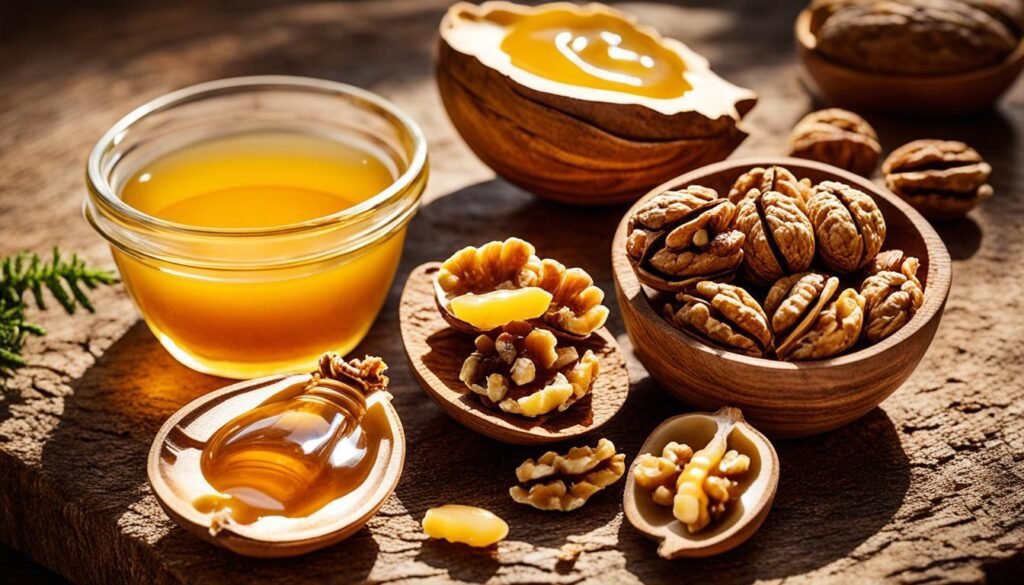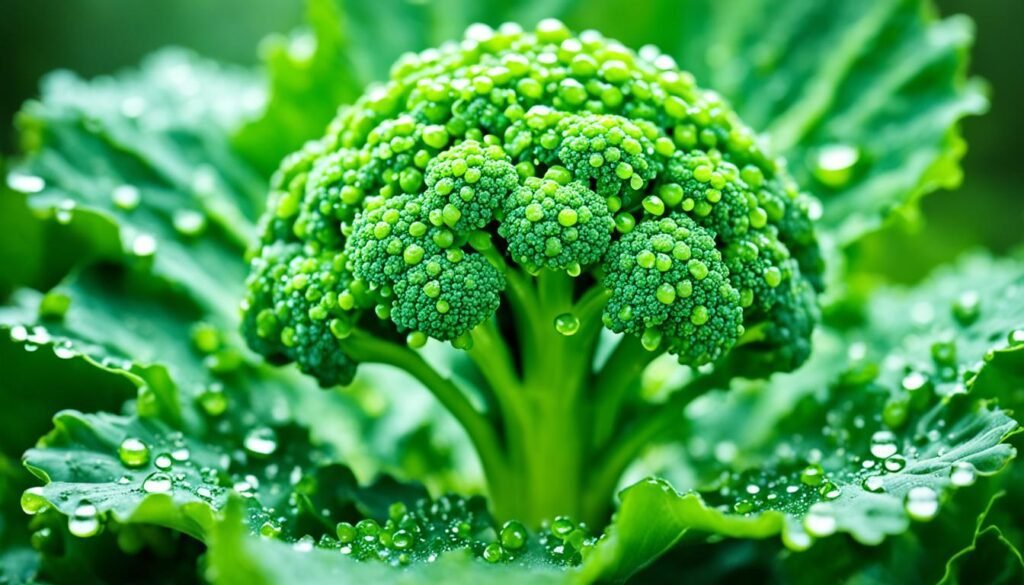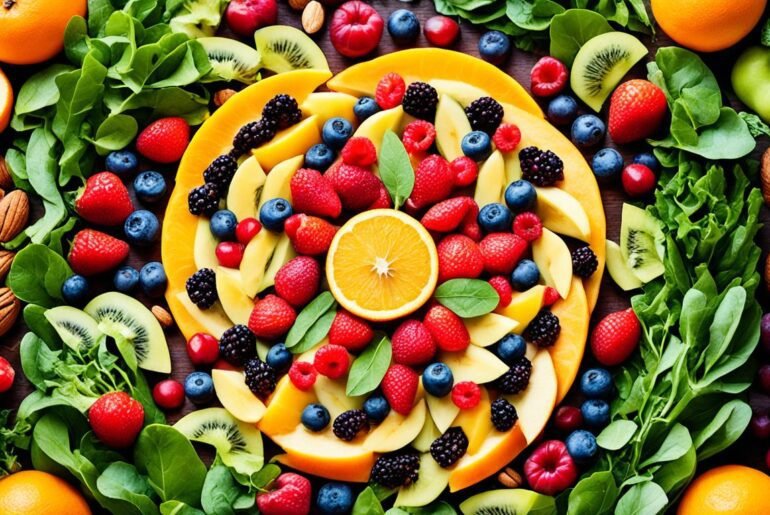Did you know that a healthy diet can significantly impact the health and appearance of your skin? The foods you eat play a crucial role in nourishing your skin from within and promoting a radiant complexion. By incorporating specific nutrients into your diet, you can support skin health and slow down the aging process.
If you’re looking for natural ways to care for your skin, focusing on a healthy diet is a great place to start. Certain foods are packed with essential vitamins, minerals, and antioxidants that are known to benefit skin health. Let’s explore the power of nutrition and discover the best foods for maintaining healthy and glowing skin.
Key Takeaways:
- A healthy diet is crucial for maintaining healthy skin.
- Specific nutrients, such as omega-3 fatty acids, vitamins E and C, zinc, and antioxidants, support skin health.
- Fatty fish, avocados, walnuts, sunflower seeds, sweet potatoes, bell peppers, broccoli, tomatoes, soy, and green tea are among the foods that are beneficial for skin health.
- Incorporating these foods into your diet can nourish your skin from within and promote a radiant complexion.
- Remember, healthy skin starts from the inside out.
The Importance of Nutrition for Skin Health
Nutrition plays a vital role in maintaining overall health, including the health of our skin. A proper diet can not only support our body’s functions but also have a profound impact on the aging process of our skin. Unhealthy diets, on the other hand, can lead to metabolic issues, weight gain, and organ damage, ultimately affecting the quality of our skin.
Research has shown that specific nutrients can play a particularly beneficial role in maintaining healthy skin. Including these nutrients in our diet through the consumption of specific foods can support skin health and slow down the aging process, helping us achieve a radiant and youthful complexion.
The Impact of Nutrition on Aging
As we age, our skin undergoes various changes, such as a decrease in collagen production and elasticity, leading to the formation of wrinkles and sagging. However, research suggests that a nutritious diet can help combat these signs of aging and promote healthier, more youthful-looking skin.
Omega-3 fatty acids, found in fatty fish like salmon and mackerel, have been shown to reduce inflammation and help maintain the skin’s moisture levels, improving its overall appearance. Vitamins E and C, both antioxidants, play a crucial role in protecting the skin from oxidative damage caused by free radicals and promoting collagen production, respectively. Zinc, another important nutrient, aids in regulating inflammation and supporting skin health.
“A healthy diet rich in essential nutrients can contribute to healthier, more youthful-looking skin, slowing down the aging process and promoting a radiant complexion.”
Foods for Healthy Skin
To incorporate these beneficial nutrients into your diet, consider adding the following foods:
- Fatty fish: Rich in omega-3 fatty acids, which have anti-inflammatory properties and contribute to moisturized skin.
- Avocados: Packed with healthy fats, vitamins E and C, promoting skin moisture retention and protection against oxidative damage.
- Walnuts: Provide essential fatty acids, zinc, and antioxidants, supporting skin health and reducing inflammation.
- Sunflower seeds: A good source of vitamin E, benefiting skin barrier function and wound healing.
Supporting Skin Health with Diet
By prioritizing a balanced diet rich in these essential nutrients, you can nourish your skin from within, maintaining its health, and supporting a youthful appearance. Additionally, it is vital to stay hydrated, limit the consumption of processed foods, and avoid excessive sun exposure to further protect your skin.
Remember, a healthy diet is not only essential for maintaining overall well-being but also plays a significant role in preserving the health and vitality of your skin.
Fatty Fish for Healthy Skin

Fatty fish, such as salmon, mackerel, and herring, are incredible sources of nutrients that contribute to maintaining healthy skin. Their high content of omega-3 fatty acids is particularly beneficial for skin health.
Omega-3 fatty acids play a crucial role in keeping the skin thick, supple, and moisturized. They also help reduce skin inflammation and make the skin less sensitive to the sun’s harmful UV rays.
Aside from omega-3 fatty acids, fatty fish are rich in other essential nutrients, including vitamin E and zinc. Vitamin E acts as a potent antioxidant, protecting the skin from oxidative damage and promoting overall skin health. Zinc is vital for regulating inflammation, supporting skin health, and stimulating the production of new skin cells.
Including fatty fish, such as salmon, mackerel, and herring, in your diet is an excellent way to nourish your skin from within and promote a healthy complexion. Take a look at the table below for a comprehensive overview of the nutrients found in fatty fish:
| Fatty Fish Nutrients | Omega-3 Fatty Acids | Vitamin E | Zinc |
|---|---|---|---|
| Salmon | ✓ | ✓ | ✓ |
| Mackerel | ✓ | ✓ | ✓ |
| Herring | ✓ | ✓ | ✓ |
Adding fatty fish to your diet is a simple and delicious way to support your skin’s health. Not only will you enjoy the benefits of omega-3 fatty acids, but you’ll also provide your body with essential nutrients like vitamin E and zinc.
Avocados for Nourished Skin
Avocados are a delicious and nutritious fruit that can contribute to healthy and nourished skin. Packed with beneficial nutrients, avocados offer a range of skin-boosting properties.
Fueling Your Skin with Healthy Fats
Avocados are rich in healthy fats, including monounsaturated fats, which are essential for maintaining skin health. These fats help keep the skin moisturized, flexible, and supple. By incorporating avocados into your diet, you can provide your skin with the nourishment it needs to maintain a healthy lipid barrier.
Protecting Your Skin with Antioxidants
Vitamin E is a potent antioxidant present in avocados. This vitamin helps protect the skin from oxidative damage caused by free radicals, environmental pollutants, and sun exposure. By including avocados in your diet, you can give your skin an extra layer of defense against harmful elements.
Boosting Collagen Production with Vitamin C
Avocados are also a great source of vitamin C, which plays a crucial role in collagen production. Collagen is a protein that maintains the structure and elasticity of the skin. By consuming avocados regularly, you can support collagen synthesis, resulting in firmer and more youthful-looking skin.
“Avocados are a versatile, nutrient-rich fruit that can nourish your skin from the inside out.”
Preventing Sun Damage
In addition to its antioxidant properties, avocados also contain natural sun protection factors. While they shouldn’t substitute sunscreen, the presence of vitamins E and C in avocados can help protect the skin from harmful UV rays. Including avocados in your diet can provide an extra layer of defense against sun damage.
Nutritional Content of Avocados
| Nutrient | Amount per 100g |
|---|---|
| Healthy Fats | 14.7g |
| Vitamin E | 2.07mg |
| Vitamin C | 10.0mg |
Avocados are a versatile addition to any diet, and their benefits extend beyond just nourishing the skin. Incorporating avocados into your meals can provide a host of other health benefits, including improved heart health and digestion.
Next time you’re at the grocery store, be sure to grab some avocados and start reaping the rewards of their skin-loving nutrients.
Walnuts for Skin Health

When it comes to promoting healthy skin, walnuts are an absolute powerhouse. These delicious nuts are packed with essential fatty acids, such as omega-3 and omega-6, that play a vital role in reducing inflammation within the body, including the skin. By incorporating walnuts into your diet, you can nourish your skin from the inside out and improve its overall condition.
In addition to essential fatty acids, walnuts also provide an abundance of zinc, a mineral known for its importance in maintaining healthy skin. Zinc is involved in various skin functions, including wound healing and combating inflammation. By consuming walnuts, you can ensure that your skin has an adequate supply of this valuable mineral to support its proper functioning.
Furthermore, walnuts are rich in antioxidants like vitamin E and selenium that safeguard the skin from environmental damage. These antioxidants protect the skin’s cells from harmful free radicals, helping to maintain its overall health and radiance.
| Nutrient | Amount per 1 oz (28g) serving |
|---|---|
| Omega-3 Fatty Acids | 2.6 grams |
| Zinc | 0.9 milligrams |
| Vitamin E | 1.2 milligrams |
| Selenium | 1.4 micrograms |
Including walnuts as part of your daily diet can have a significant impact on the health and appearance of your skin. These nutrient-rich nuts provide essential fatty acids, zinc, and antioxidants that are all essential for maintaining optimal skin health. So why not add a handful of walnuts to your meals or snacks? Your skin will thank you!
Source:
USDA. “Nuts, Walnuts, English.” National Nutrient Database for Standard Reference Release 28.
Sunflower Seeds for Skin Protection
When it comes to protecting your skin from oxidative damage, sunflower seeds are a powerful ally. These nutritious seeds are packed with vitamin E, a potent antioxidant that helps shield the skin from harmful free radicals.
Vitamin E plays a crucial role in maintaining skin health by supporting its natural barrier function. This barrier helps prevent moisture loss and keeps the skin soft and supple. Additionally, vitamin E promotes wound healing, helping to repair skin damage and maintain its overall integrity.
By including sunflower seeds in your diet, you can harness the benefits of vitamin E and nourish your skin from within. These tiny seeds are not only delicious but also convenient to incorporate into your daily routine.
The Benefits of Vitamin E in Sunflower Seeds
Vitamin E is a fat-soluble antioxidant that neutralizes free radicals, protecting cell membranes from damage. In the context of skin health, vitamin E’s antioxidant properties support the prevention of premature aging, including wrinkles, fine lines, and age spots.
Moreover, vitamin E helps protect the skin against the harmful effects of ultraviolet (UV) radiation. UV rays can cause oxidative stress, leading to skin damage and an increased risk of skin cancer. By including vitamin E-rich foods like sunflower seeds in your diet, you can enhance your skin’s defense against the sun’s harmful rays.
Not only do sunflower seeds provide vitamin E, but they also offer other valuable nutrients for skin health. These nutrients include essential fatty acids, such as linoleic acid, which contribute to the maintenance of healthy skin.
| Nutrient | Amount per 1 oz (28g) serving |
|---|---|
| Vitamin E | 7.38 mg (46% of the Daily Value) |
| Linoleic Acid (Omega-6 fatty acid) | 9.20 g |
| Protein | 5.04 g |
| Fiber | 2.40 g |
Adding a handful of sunflower seeds to your salads, porridge, or trail mix can be a simple and delicious way to incorporate this skin-protective nutrient into your daily routine. Just be mindful of portion sizes, as sunflower seeds are calorie-dense.
Remember, healthy skin begins from the inside out. Nourish your skin with the power of sunflower seeds and enjoy the benefits of vitamin E and other essential nutrients.
Sweet Potatoes for Skin Care

Sweet potatoes are not only a delicious addition to your meals, but they also offer numerous benefits for your skin health. These vibrant root vegetables are packed with beta carotene, an antioxidant that gives them their rich orange color.
Beta carotene is converted into vitamin A in the body, which plays a vital role in maintaining healthy skin. Vitamin A is essential for cell development, including the cells that make up the outer layer of your skin. It contributes to the production of collagen, a protein that gives your skin its elasticity and helps to prevent wrinkles.
One of the remarkable benefits of sweet potatoes is their ability to act as a natural sunblock. Beta carotene has been found to protect the skin from harmful UV rays by absorbing the sun’s radiation. While it’s not a substitute for sunscreen, incorporating sweet potatoes into your diet can provide an additional layer of sun protection.
Eating sweet potatoes regularly can also improve your skin’s appearance and overall health. The antioxidants present in these root vegetables help combat oxidative stress and inflammation, which can contribute to aging skin and skin conditions like acne.
By including sweet potatoes as part of a balanced diet, you can nourish your skin from within and support its natural defenses against environmental damage. Whether mashed, roasted, or added to your favorite dishes, sweet potatoes are a versatile and nutritious addition to your skincare routine.
| Nutrient | Amount per 100g |
|---|---|
| Beta Carotene | 15,218 µg |
| Vitamin A | 9,631 IU |
| Vitamin C | 2.4 mg |
| Fiber | 3 g |
Additional Benefits of Sweet Potatoes:
- Rich in antioxidants that help fight free radicals and protect skin cells.
- Contain vitamins C and E, which promote collagen production and maintain skin elasticity.
- Source of dietary fiber, supporting healthy digestion and preventing skin issues caused by toxins buildup.
Including sweet potatoes in your diet is a delicious and nutritious way to support your skin health. So next time you’re meal planning, consider adding some sweet potatoes to your shopping list and reap the benefits for your skin!
Bell Peppers for Antioxidant Boost

When it comes to supporting the health of your skin, bell peppers, especially the vibrant red and yellow varieties, are a fantastic addition to your diet. These colorful peppers are not only delicious but also packed with essential nutrients that promote skin health and vitality.
One of the key benefits of bell peppers for the skin is their high content of beta carotene. Beta carotene is a powerful antioxidant that helps protect the skin from damage caused by free radicals, which can lead to premature aging and skin sagging. By including bell peppers in your meals, you can give your skin an antioxidant boost and promote a more youthful appearance.
Another reason why bell peppers are great for your skin is their rich vitamin C content. Vitamin C is a crucial nutrient for collagen production, a protein that plays a vital role in maintaining the strength and elasticity of the skin. By consuming bell peppers regularly, you can support collagen production and promote firmer, smoother skin.
To illustrate the benefits of bell peppers for skin health, here’s a breakdown of the key nutrients found in a typical bell pepper:
| Nutrient | Amount |
|---|---|
| Beta Carotene | 1652 mcg |
| Vitamin C | 152 mg |
| Vitamin E | 2.35 mg |
| Collagen Production | Support |
As you can see, bell peppers are a rich source of beta carotene and vitamin C, providing significant benefits for your skin’s health and appearance.
Adding bell peppers to your meals is easy. You can enjoy them raw in salads or as crunchy snacks, or you can incorporate them into a variety of cooked dishes, such as stir-fries, fajitas, or roasted vegetable medleys.
Remember, a diet rich in bell peppers can give your skin the antioxidant boost it needs, protect it from free radical damage, and promote collagen production. So, why not add some bell peppers to your next meal and enjoy the benefits they offer for your skin?
Broccoli for Skin Health

Incorporating broccoli into your diet can have significant benefits for your skin health. Broccoli is a powerhouse vegetable that is packed with essential vitamins and minerals, including vitamins A, C, and E. These vitamins act as powerful antioxidants, helping protect your skin from oxidative damage and maintaining its overall health.
Vitamin A is known for its role in promoting healthy skin cell development and maintaining a youthful appearance. It also supports collagen production, which is essential for maintaining skin elasticity and firmness. Vitamin C, another vital nutrient found in broccoli, plays a crucial role in collagen synthesis, contributing to the skin’s strength and resilience. Additionally, vitamin C helps reduce the appearance of skin discoloration and promotes a more even skin tone.
Vitamin E, yet another antioxidant present in broccoli, provides protection against environmental stressors and combats free radicals, which are known to cause skin aging. This vitamin also supports skin hydration and helps maintain its natural moisture barrier, resulting in a more supple and hydrated complexion.
One of the unique compounds found in broccoli is sulforaphane. This powerful compound has demonstrated anti-cancer effects and helps protect the skin from sun damage. Sulforaphane has also been shown to support the skin’s natural detoxification process, promoting a clearer and healthier complexion.
By adding broccoli to your daily meals or incorporating it into your favorite recipes, you can enjoy the numerous skin benefits it offers. Whether steamed, roasted, or incorporated into stir-fries and salads, broccoli is a versatile and nutritious addition to your diet.
Broccoli Nutritional Facts
| Nutrient | Amount per 100g |
|---|---|
| Calories | 34 |
| Protein | 2.8g |
| Fat | 0.4g |
| Carbohydrates | 6.6g |
| Fiber | 2.6g |
| Vitamin A | 623 IU |
| Vitamin C | 89.2mg |
| Vitamin E | 0.78mg |
| Sulforaphane | Varies |
Conclusion
A healthy diet is vital for natural skin care and can significantly contribute to achieving a glowing complexion. By incorporating nourishing foods into your daily meals, you can provide your skin with the essential nutrients it needs to stay healthy and slow down the aging process.
Omega-3 fatty acids, found in fatty fish like salmon, mackerel, and herring, help keep the skin moisturized and reduce inflammation. Avocados, rich in healthy fats, vitamins E and C, protect the skin from damage and promote collagen production. Walnuts, sunflower seeds, and bell peppers are excellent sources of antioxidants and essential fatty acids that nourish the skin and improve its overall health.
Including foods like sweet potatoes, broccoli, and tomatoes in your diet, which are packed with vital vitamins and minerals, can further enhance your skin’s health and protection against sun damage. Supporting skin elasticity and hydration, soy isoflavones can also be included as part of a healthy diet. Finally, incorporating green tea into your routine can provide additional benefits for your skin due to its high antioxidant content.
Remember, healthy skin starts from within. By embracing a healthy diet filled with these nourishing foods, you can nourish your skin from the inside out and achieve a radiant, glowing complexion. So, make it a priority to include these skin-loving foods in your meals and let your healthy diet do wonders for your natural skin care routine.
FAQ
How does diet affect skin health?
A healthy diet plays a crucial role in maintaining healthy skin. Certain foods provide essential nutrients that support skin health and slow down the aging process.
What nutrients are important for skin health?
Omega-3 fatty acids, vitamins E and C, zinc, and antioxidants are particularly beneficial for skin health.
Which foods are rich in omega-3 fatty acids?
Fatty fish like salmon, mackerel, and herring are excellent sources of omega-3 fatty acids.
How can avocados benefit the skin?
Avocados contain healthy fats, vitamin E, and vitamin C, which protect the skin from damage and promote collagen production.
What makes walnuts good for skin health?
Walnuts are rich in essential fatty acids, zinc, and antioxidants that contribute to skin health.
What nutrients do sunflower seeds provide for the skin?
Sunflower seeds are a rich source of vitamin E, an important antioxidant for the skin.
How do sweet potatoes contribute to skin care?
Sweet potatoes are rich in beta carotene, which acts as a natural sunblock and helps protect the skin from sun damage.
How can bell peppers boost antioxidant levels for the skin?
Bell peppers, especially the red and yellow varieties, are rich in beta carotene and vitamin C, both of which are important antioxidants for the skin.
What makes broccoli beneficial for skin health?
Broccoli contains vitamins A, C, and E, as well as sulforaphane, a compound that protects the skin from damage.
How can a healthy diet improve skin health?
A healthy diet with nourishing foods can provide essential nutrients and support overall skin health, leading to a glowing complexion.




